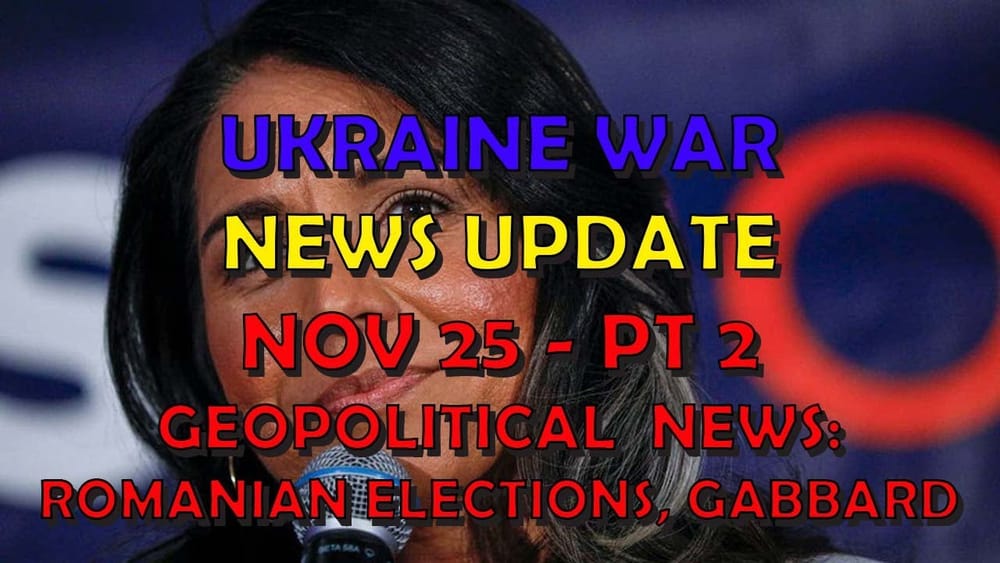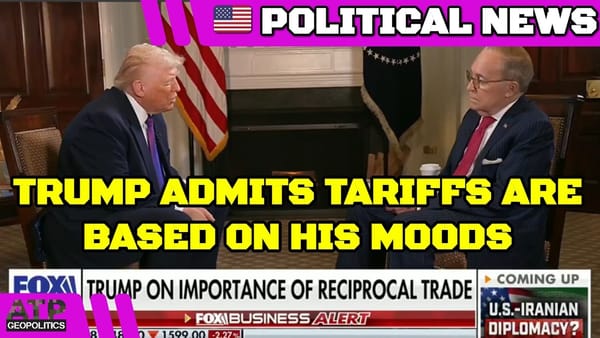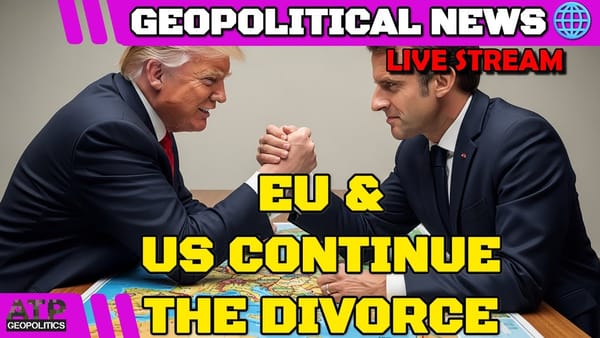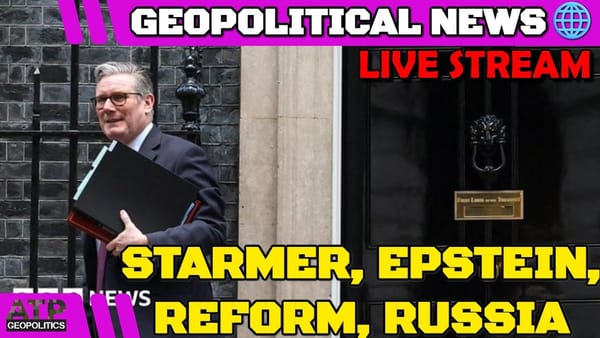Ukraine War Update NEWS: Geopolitical News
Table of Contents 📖
"She is, hook, line and sinker, a Russian puppet."
Hello Team
🎦 00:00-00:10⏩
Jonathan welcomes viewers to the channel for the third part of the Ukraine War Update NEWS video for 25th November 2024 and mentions that he will continue to discuss the subject of US military aid (specifically ammunition and weapons) raised in the previous video.
Return to top⤴️
US Military Aid: Importance of consistent supply of ammunition
🎦 00:11-02:52⏩
Jonathan continues the conversation started in the previous video about the importance of consistent US military aid to Ukraine. He highlights the importance of the "boring stuff" such as ammunition, HIMARS missiles and artillery shells, emphasizing that without this consistent support, Ukraine would be in "serious trouble". Jonathan refers to the seven-month hiatus in aid when the appropriations bill failed to get through Congress, citing an article in the Financial Times by Edward Stringer (a retired Air Force Commander from the UK) and a comment by Shashank Joshi from The Economist.
- Stringer points out that maintaining ammunition stockpiles, transport, and logistics, which is crucial in warfare, is something "almost nobody does properly at scale except for the US".
- Joshi calculates that "fully replacing the US military contribution is equivalent to about 0.3% of the EU GDP". A European defence official acknowledges this would be a difficult decision as most of the equipment would have to be bought from the Americans.
Jonathan concludes that this would require the EU and Europe to increase the scale of production and might also necessitate purchasing a significant amount from the US, leading to even greater expenditures.
Return to top⤴️
Georgia: Protests in Tbilisi
🎦 02:58-03:47⏩
- Protests are taking place in Tbilisi, Georgia, with people spending the night in front of Parliament.
- Despite protests and opposition parties refusing mandates, the Georgian Dream party has announced that the first session of parliament will be held.
- Security forces urge protestors not to "cross the boundaries of law", threatening police action if necessary.
Jonathan hopes that the Georgian people can successfully protest but acknowledges the challenges they face.
Return to top⤴️
Romania: Pro-Russia candidate leads in Presidential election
🎦 03:47-07:52⏩
Jonathan discusses the surprise victory of a pro-Russian candidate, Kalin Dziurgescu, in the first round of the Romanian presidential elections.
- Dziurgescu, a right-wing independent candidate who only registered on 1st October, has been critical of military aid to Ukraine and has opposed EU policies.
- The news is widely reported in media sources, including GNQ, the Financial Times and the Kyiv Independent.
- Jonathan shares data/polling information from various sources including Max24 and an unnamed source who describes the election results as "colossally fishy".
- The results have caused panic and many Romanians and Romanian media perceive it as a "Russian attack".
- Jonathan presents a graph showing Dziurgescu's dramatic rise in popularity. He reads a user comment suggesting that people may have been misled by Dziurgescu's portrayal on TikTok as a moderate nationalist.
- The second round of the election is scheduled for 8th December.
Jonathan expresses concern about the outcome, emphasizing the crucial role Romania plays in supporting Ukraine. He notes:
- If Dziurgescu wins, it will be a significant concern.
- Romania is a vital component of European and NATO support for Ukraine.
- Romania is a NATO member and a training ground for F-16 pilots.
- It is essential that Romania remains a steadfast supporter of Ukraine, similar to Bulgaria's role in the region.
Poland: Farmers suspend border crossing blockade with Ukraine
🎦 07:52-08:01⏩
Polish farmers who had been protesting in Medica and blocking the Shagini border crossing with Ukraine have now suspended their blockade.
Return to top⤴️
Germany: Olaf Scholz nominated as Chancellor Candidate
🎦 08:01-08:12⏩
Despite the SPD's low poll numbers after the coalition collapse, they have unanimously nominated Olaf Scholz as their chancellor candidate for the upcoming election, especially after Boris Pistorius withdrew his candidacy.
Return to top⤴️
Lithuania: DHL Cargo Plane crash in Vilnius
🎦 08:12-09:10⏩
Jonathan reports a DHL cargo plane crash at Vilnius Airport in Lithuania, resulting in one crew member's death and hospitalisations of others. He expresses condolences to the victims' families and shares Gabrieli Lansbergis' (former Lithuanian foreign minister) confirmation of the tragic incident.
- The cause of the crash is currently unknown, and investigations are ongoing. Jonathan notes that DHL planes have been targets of suspected Russian explosive parcels in the past, with at least two instances originating from Leipzig, Germany. The crashed plane also originated from Leipzig.
- While Russian interference is a possibility, it's not confirmed.
Jonathan emphasizes the importance of a conclusive investigation to determine the cause of the crash and prevent Russia from using ambiguity to evade responsibility.
Return to top⤴️
South Korea: Russia threatens South Korea over military aid
🎦 09:10-10:35⏩
Jonathan discusses Russia's warning to South Korea about providing military aid to Ukraine, highlighting the hypocrisy in Russia's stance.
- Anton Gerashenko reports that Russia's Deputy Foreign Minister, Andrei Rudenko, urged South Korea to "soberly assess the situation" and avoid "reckless steps".
- Jonathan is amused by the irony, noting that Russia is lecturing South Korea on reckless behaviour while simultaneously engaging in actions like deploying North Korean soldiers, expanding a North Korean missile factory, and acquiring millions of artillery rounds from North Korea.
- He questions Russia's authority to accuse South Korea of recklessness given their own actions, citing examples of Russia's activities in North Korea.
Jonathan quotes the Russian Deputy Foreign Minister's threats: > Seoul must realize that the possible use of South Korean weapons to kill Russian citizens will fully destroy relations between our countries. Of course, we will respond in every way that we find necessary. It is unlikely that this will strengthen the security of the Republic of Korea itself. Jonathan believes that South Korea's long-term interests would be better served by providing military aid to Ukraine and helping defeat Russia, contrary to the Russian Foreign Minister's assertion that South Korea should prioritize long-term national interests over "short-term opportunistic considerations prompted from the outside".
Return to top⤴️
Russia's Global Influence Operations
🎦 10:35-11:12⏩
Jonathan observes a pattern of Russia's increasing global involvement and influence operations, expressing concern over their successes. He points to:
- The US being "compromised" by Russian influence despite being Ukraine's biggest supporter
- European nations also being compromised
- The effectiveness of Russia's influence operations
Jonathan finds this situation deeply disheartening.
Return to top⤴️
UK Sanctions Russia's Shadow Fleet
🎦 11:12-11:50⏩
Jonathan reports that Britain has implemented sanctions on 30 ships from Russia's shadow fleet.
- This is the UK's largest sanctions package to date, targeting vessels that have moved over $4.3 billion worth of oil and petroleum products in the past year.
- The sanctions extend to Russian insurance companies, including Alpha Strakovani and VSK.
Jonathan hopes these measures will be impactful and praises the UK's actions.
Return to top⤴️
US: Cyber Security threats from Russia
🎦 11:50-12:34⏩
Jonathan transitions to discussing the US, where the impact of the elections is still felt, and begins by addressing cyber security threats from Russia.
- He cites Pat McFadden, the UK Cabinet Office Minister, who warns against underestimating the Russian cyber threat to NATO, describing Russia's cyber activity as "exceptionally aggressive and reckless".
- McFadden cautions that cyber attacks from Moscow could disrupt electricity for millions in NATO countries, a topic scheduled for discussion at the NATO Cyber Security Conference in London.
- Jonathan is pleased that the Russian threat to NATO is finally being acknowledged, expressing hope for decisive actions to follow.
US: Concerns about Russian disinformation and influence
🎦 12:34-18:28⏩
Jonathan expresses deep concern over the widespread acceptance of the Russian narrative in the US.
- He is frustrated that many Americans fail to see Russia as a threat and instead direct their concerns toward internal issues or Ukraine and Zelensky.
- He shares examples to illustrate his point:
- Joe Rogan's recent negative comments about Ukraine and Zelensky
- Candice Owens' dismissive response to Vladimir Klitschko's offer to discuss the reality in Ukraine on her podcast
- Jonathan highlights the stark contrast between Klitschko's commitment to defending Ukraine, despite his wealth and international fame, and Owens' immature and dismissive reaction.
- He believes this episode highlights how deeply the Russian narrative has taken hold in some people's minds and recounts his own experiences arguing with people on Facebook who have "drunk the Russian Kool-Aid".
- He is particularly troubled by Donald Trump's vow to crack down on universities involved in misinformation research, which Trump refers to as the "censorship cartel". This would involve reducing funding to institutions that flag content for removal or legal action. Jonathan finds this alarming and shares a professor's fear: "I'm pretty effing scared."
- He cites a Financial Times article titled "Donald Trump's return since shivers through the anti-misinformation world" to emphasize his point.
- He describes the fight against disinformation as his "raison d'etre" and expresses concern about losing this battle due to the pervasive influence of figures like Trump and Elon Musk.
- He criticizes Musk's manipulation of Twitter's algorithms to amplify his own voice and suppress Ukrainian news, which he sees as benefitting Putin.
- He believes Putin is possibly the most successful "stirrer in the world", adept at compromising individuals like Musk and Trump.
- He fears that Trump's actions will hinder efforts to expose disinformation, making the task significantly more challenging and expressing his deep frustration and worry about the situation.
- Jonathan makes a personal digression about Elon Musk's family, sharing information about Musk's father being a "wingnut" and his maternal grandparents escaping from Canada to apartheid South Africa after World War II due to their pro-Nazi affiliations. He connects these historical details to understand Elon Musk's worldview.
US: Trump's Security Pick Calls for End to Escalation in Ukraine
🎦 18:28-19:38⏩
Jonathan continues to discuss US politics, focusing on Trump's pick for a top security role who is calling for a de-escalation of the situation in Ukraine, seemingly placing the blame on Ukraine or the Biden administration.
- The individual, Mike Waltz, advocates for restoring deterrence and peace and "getting ahead of this escalation ladder rather than responding to it".
Jonathan believes this statement can be interpreted in multiple ways:
- Criticism of the current situation and a desire for appeasement.
- A belief that US flexing of military muscle would deter Russia and lead to de-escalation.
Jonathan highlights the potential for such an approach to lead to appeasement and the imposition of peace, questioning the long-term consequences.
Return to top⤴️
US: Analysis of Keith Kellogg and Fred Fleiss' Ukraine Peace Plan
🎦 19:38-23:56⏩
Jonathan discusses Keith Kellogg and Fred Fleiss, two influential figures in Trump's team, who developed a peace plan for Ukraine which Trump has been promoting.
- Shashank Joshi, commenting on a recent book chapter by Kellogg and Fleiss, criticizes their "vitriolic and extreme tone towards Biden".
- The book promotes a view that it is in America's best interest to maintain peace with Putin and avoid "aggressive globalist human rights and pro-democracy campaigns" which might provoke him.
- They criticize the Biden administration's "liberal internationalist" approach, claiming that Biden is not interested in working with Putin but instead seeks to "lecture and isolate him".
- Jonathan is critical of their view, pointing out that Biden replaced Trump's transactional approach to Russia with a liberal internationalist one promoting Western values.
- He also criticizes their false claim that a US offer to delay Ukraine's NATO admission by 10 years might have been enough to prevent the war in 2022. Jonathan points to public statements by Russian officials at the time explicitly rejecting this idea.
- While acknowledging that Kellogg and Fleiss condemn the Russian invasion as heinous and support arming Ukraine to prevent further Russian advances, Jonathan criticizes their lack of clarity regarding financial and military commitments and their failure to address the possibility of peace talks failing.
- Jonathan is slightly encouraged by their suggestion that Ukraine would not be asked to formally cede territory and that sanctions would remain until Russia agreed to a settlement acceptable to Ukraine. He also notes their proposal to use levies on Russian energy sales to fund Ukrainian reconstruction.
Jonathan acknowledges that elements of the Fleiss-Kellogg approach might be adopted if Trump becomes president.
- While acknowledging that they are not "total Russian appeasers", he disagrees with their methods, particularly their idea of forcing both Ukraine and Russia to the negotiating table by threatening to withdraw support from Ukraine if they refuse.
- Jonathan agrees with a comment that describes their stance as "pure MAGA double thinking action", pointing to the contradictory portrayal of Putin as both a victim of "libertarian human right globalist ideology" and a dangerous thug who must be stopped.
- He sees this as "doublespeak" characteristic of the MAGA movement, where the narrative attempts to portray both the US and Russia as the bad guys.
US: Concerns about Tulsi Gabbard as Potential DNI
🎦 23:56-38:34⏩
Jonathan expresses serious concerns about the potential appointment of Tulsi Gabbard as Director of National Intelligence (DNI) in a Trump administration, highlighting her history of pro-Russian views and susceptibility to Russian disinformation.
- He cites an article in The Independent titled "Tulsi Gabbard's history with Russia is even more concerning than you think", which details her consistent support for Russia's positions in various global conflicts, including Syria and Ukraine.
- An expert quoted in the article finds Gabbard's views alarming, describing them as "so wildly fringe that her potential appointment as director of national intelligence is genuinely alarming".
- The article examines Gabbard's alignment with Russian narratives and conspiracy theories, including the debunked claim about US-funded biolabs in Ukraine producing deadly pathogens. Despite later backtracking, Gabbard's initial endorsement of this conspiracy theory has earned her praise from Russian state media.
- Jonathan finds it deeply concerning that someone who believes Russia has legitimate security concerns could be in charge of US national intelligence. He reads excerpts from the article highlighting Gabbard's troubling history.
- He points to Trump's past affinity for Putin and his dismissal of US intelligence assessments about Russian interference in the 2016 election as a cause for concern.
- Jonathan recounts Trump's infamous Helsinki summit with Putin in 2018, where Trump sided with Putin over his own intelligence community regarding Russian election meddling, describing it as Trump's "worst moment in international politics".
- He notes that Trump's denial of Russian interference contradicted evidence from Facebook, Twitter, and the US intelligence community. He criticizes Trump for repeatedly clashing with his own intelligence appointees, including firing his first DNI, Dan Coats, for refusing to back down from the government's assessment of Russian interference.
- Jonathan emphasizes the significance of the intelligence community's findings being corroborated by social media companies and criticizes Trump for prioritizing his own narrative over reality.
- He is concerned that a second Trump administration, with Gabbard as DNI, will pose significant challenges for intelligence sharing and trust among US allies, citing concerns from Larry Pfeiffer, a former intelligence official.
- Pfeiffer predicts that European intelligence agencies might withhold sensitive information from the US due to concerns about Gabbard's susceptibility to Russian influence.
- Jonathan believes that Gabbard's record of promoting pro-Kremlin talking points raises serious doubts about her ability to provide objective intelligence briefings to the president.
- He quotes a former US intelligence veteran: "For somebody like Tosie Gabbard, you look at her long history of statements that seem to come out of the Kremlin's notebook, her propensity to be influenced by their viewpoint, it raises questions as to whether she has the ability to present the intel community's perspective as it is, or is she going to be one who's going to want to discount it, influence it, cover it, and change it, or ignore it, and just present her own view."
- Jonathan agrees with the assessment that Gabbard's susceptibility to misinformation and conspiracy theories poses a threat to US national security.
- He highlights concerns that Gabbard's lack of strategic experience and her history of promoting pro-Russian narratives make her unsuitable for the DNI role, which requires extensive national security expertise.
- He criticizes Gabbard's tactical military experience, arguing that it does not qualify her for a strategic intelligence role.
- He cites a comment from Mustafa, a Syrian refugee who works with victims of the Syrian conflict, who believes Gabbard is "hook, line and sinker, a Russian puppet".
- Jonathan agrees with Shashank Joshi's assessment in The Economist, which describes Gabbard's potential appointment as DNI as a "radical agenda" and warns of the negative consequences for US intelligence agencies.
- He is skeptical of claims that Gabbard's views are less extreme in private, arguing that her willingness to publicly endorse misinformation and conspiracy theories for political gain makes her even more dangerous.
- He finds it concerning that a European intelligence official reported improved intelligence sharing with the US during Trump's first term while many others are worried about the potential consequences of a second Trump term.
- Jonathan predicts a loss of experienced intelligence officers who fear "falling foul of political loyalty tests" and expresses concern about Trump's "lax approach to security", citing instances of Trump divulging classified information to Russian officials, allowing unvetted foreigners access to Mar-a-Lago, and improperly handling classified documents.
- He also criticizes Gabbard's "Russophile tendencies" and her accusation that Democrats are opposed to peaceful relations with Russia because it would threaten the profits of the military-industrial complex.
- He highlights concerns that European agencies might restrict intelligence sharing with the US due to Gabbard's presence as DNI.
- Jonathan emphasizes the seriousness of the situation, dismissing reassurances about Gabbard's potential suitability for the role.
US: H.R. McMaster's Critique of Trump and Gabbard
🎦 38:34-40:16⏩
Jonathan cites H.R. McMaster, Trump's former National Security Advisor, as a voice of reason within the Republican Party, highlighting McMaster's critique of both Trump and Gabbard.
- McMaster criticizes Gabbard for echoing Russian talking points and contradicting US intelligence conclusions.
- He expresses concern about individuals within the Republican Party who parrot Putin's talking points and urges them to "disabuse themselves of this strange affection for Vladimir Putin".
- McMaster warns that Putin's ambition is to restore Russia's national greatness "at our expense" and that he is obsessed with re-establishing the Russian Empire.
Jonathan praises McMaster for his "concisely brilliant view" on the situation.
Return to top⤴️
US: GOP Lawmakers Push Back Against Trump
🎦 40:16-43:38⏩
Jonathan discusses signs of hope within the Republican Party as some GOP lawmakers are pushing back against Trump's decisions, particularly concerning his controversial cabinet nominees.
- He cites examples of GOP senators privately expressing concerns about Trump's choices, including those regarding Tulsi Gabbard and Pete Hegseth, who faces sexual assault allegations.
- He mentions Mike Johnson's leadership role and incoming Senate Majority Leader John Thune's challenges related to Trump's cabinet picks.
- Jonathan highlights the unhealthy environment created by threats from figures like Elon Musk and Marjorie Taylor Greene to punish lawmakers who oppose Trump's decisions.
- He criticizes Musk's offer to fund primary campaigns against those who challenge Trump's choices and Taylor Greene's threats to release compromising information.
- Despite the pushback, Jonathan doubts its effectiveness, predicting that many GOP members will likely capitulate to Trump's demands. He believes that figures like Lisa Murkowski might resist, but ultimately, the Senate's ability to block Trump's nominees will depend on the Democrats' willingness to take a stand.
- He emphasizes the importance of strategically targeting opposition to certain nominees, such as Gabbard, Hegseth, and RFK Jr, to avoid creating an unmanageable situation.
- Jonathan stresses the urgent need to block Gabbard's nomination due to her concerning geopolitical views and potential impact on US support for Ukraine.
Wrap up
🎦 43:38-43:44⏩
Jonathan concludes the video thanking viewers for their support and acknowledges the length of the video.
Return to top⤴️




